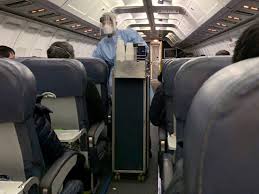
Many commentators and observers have discussed and tried to analyze what the airline industry, and people’s travel patterns and experiences will look like after the Covid pandemic. In this blog are some of my experiences what it is like to fly during times of Covid. In the past couple of months, I flew several times from Panama via Amsterdam to Paris. This meant four long-haul (transatlantic) flights and four connecting short-haul flights within Europe.
The first challenge were the PCR tests required by the airlines and the authorities in their respective countries (in this case KLM and the Netherlands, and Air France and France). On my first transatlantic flight, KLM required a 48 hours test without specifying whether the actually test had to be done within 48 hours or the test results had to be no older than 48 hours. I called up embassies, airlines, and authorities to find out more details about how this 48 hour test is defined. In each call I received a different definition or no explanation at all. As my flight was on a Tuesday, the uncertainty about what definition for the 48 hours testing applied put me in an awkward position. Doing the test on Monday might have been too late to get the results back on time and boarding would have been denied for the flight on Tuesday; doing the test on Saturday might have been too early if the airline required the test to be done within 48 hours…. At the end, I did a test on Saturday and Monday to be on the safe side….
Aside the lack of clarity of how testing times were defined, the periods in which results had to be obtained were often too short. At the end of August, French authorities required testing within 48 hours and changed this to 96 hours in September. In September, however, one could wait almost six to seven days for his/her results…..To my surprise neither ground staff at Tocumen airport in Panama City, nor the authorities at Schiphol in Amsterdam nor at Charles de Gaulle in Paris wanted to see any of my negative tests. In fact, neither before nor during any of my eight flights was I ever asked for a negative PCR test by AF or KLM ground staff or cabin crews.
Another surprising observation occurred during boarding procedures. Traditionally the boarding starts with business class travelers. Then frequent flyers and other priority travelers are invited to board. Their seats are usually situated in the front of an economy class (e.g. comfort zone at KLM and premium economy at AF). This means all other economy class passengers will have to pass these priority passengers on their way to their seats further back in the plane. In emails by Air France and KLM, passengers were informed that due to health and safety reasons, these traditional priority-boarding procedures would be suspended, and boarding would start from the back rows of economy class. This new process was aimed at reducing the contact between passengers to a minimum while boarding. However, during all of my eight flights, only one cabin crew followed these new instructions and boarded passengers starting with seat numbers in the back rows.
Another surprise was the handling of the passengers’ Covid information sheets. Every passenger received a form in which he/she had to provide name, flight number, seat number, etc. and tick off boxes that indicate if the passengers might have Covid (e.g. fever). The form stated clearly that when ticking any of the boxes with a YES, the passenger would not be allowed to board the plane. Surprisingly, however, on every one of my eight flights the Covid information sheets were handed out when airborne. And even more surprisingly, in only two cases the information sheets were collected by the cabin crews. No ground staff at the arrival were interested in passengers’ Covid information sheets.
In sum, the two airlines which I used (KLM and AF) had some very useful procedures in place that could help greatly when it comes to the health and safety of their passengers. Unfortunately, these procedures were rarely applied correctly. Like with any new procedure or process, their introduction does require some form of communication with, and training of the people who implement these procedures. When it comes to the PCR tests required for air travel, policy makers or the responsible authorities should ensure that they revise their testing statements and clearly define them; and align test result periods to the actual time it takes to get back your test results from the laboratory.